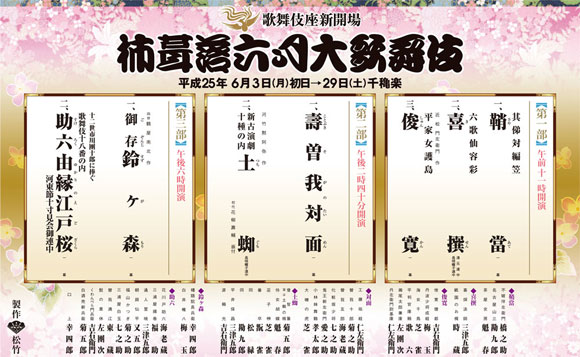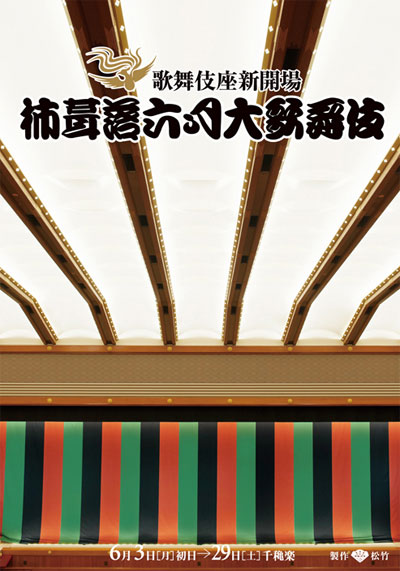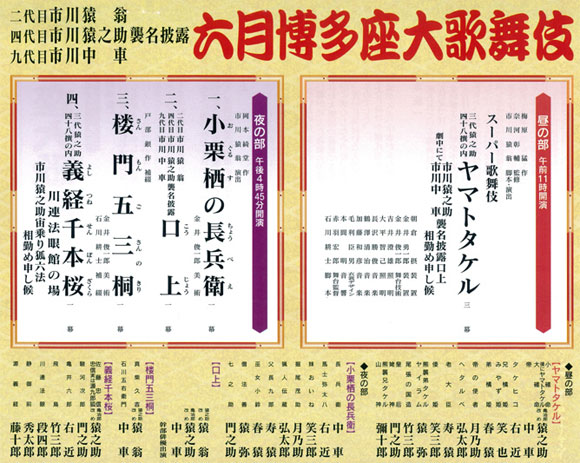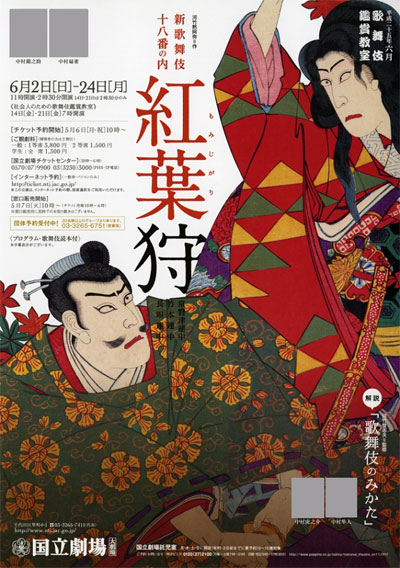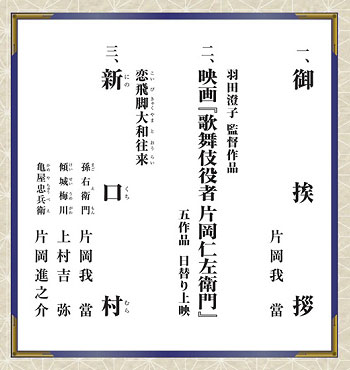| Comments |
Third month celebrating the opening of the new Kabukiza within a 1-year long cycle of kokera otoshi programs!
Sayaate: Two rivals for the love of one of the top courtesans in the pleasure quarters
encounter one another and confront each other in a series of sarcastic, poetic and stately speeches.
A play full of the color and ceremony of the most stylized age of Kabuki.
Featuring Nakamura Kankur˘, Nakamura Hashinosuke and Nakamura Kaishun in the roles of Nagoya Sanza, Fuwa Banzaemon and the tea house mistress.
Kisen: "Kisen" is part of a series of dances showing the six poetic
geniuses of ancient Japan. The five male poets are all shown as being in love with
the sixth, Ono no Komachi, one of the most famous beauties of Japan.
The other dances are set in ancient Japan, but this dance suddenly jumps to the
Edo period where the poet-priest Kisen wanders intoxicated by the beauties of
the cherry blossoms and of Okaji, a tea stand waitress.
Starring Band˘ Mitsugor˘ as Kisen and Nakamura Tokiz˘ as Okaji.
Shunkan: the priest Shunkan (Nakamura Kichiemon) has been exiled to Devil's Island for
plotting against the dictator Kiyomori. A pardon is given to his fellow conspirators, but
Shunkan is only saved by an additional pardon given by Kiyomori's compassionate son. Even so,
he gives up his place on the boat to freedom so his companion's new wife can accompany
her husband back to the capital. The boat leaves and Shunkan is left watching is disappear
in the distance, knowing he will be left on the island forever.
Featuring Ichikawa Sadanji as the evil emissary Senoo and Kataoka Nizaemon as
the merciful envoy Tanzaemon. With Nakamura Shibajaku as the island girl Chidori and Nakamura Baigyoku as Naritsune,
Shunkan's fellow exile who has fallen in love with her.
Soga no Taimen: this is one of the oldest and most classical of all
Kabuki plays. In the Edo period, every January, plays appeared about the vendetta
carried out by the Soga brothers Jűr˘ and Gor˘ after eighteen years of hardship.
In "Soga no Taimen" the brothers confront Kud˘ Suketsune, the man responsible for
their father's death. More ceremony than play, it features each of the important
Kabuki character types, including the bombastic aragoto
style of Gor˘ and the soft wagoto style
of Jűr˘. This month features a cast headed by Kataoka Nizaemon as Kud˘
and some of the most popular young stars in Kabuki with Ichikawa Ebiz˘ as Gor˘ and
Onoe Kikunosuke as Jűr˘. Featuring also Nakamura Shibajaku, Kataoka Takatar˘, Kataoka Ainosuke and Nakamura Shichinosuke.
Tsuchi-gumo: a dance play adapted from the classical N˘ theatre.
The samurai Lord Minamoto Raik˘ is famous in legend for ridding Ky˘to of demons.
While Raik˘ is confined to bed with illness, a priest (Onoe Kikugor˘) from a prominent
temple comes to pray for his health. In fact, the priest is actually the spirit
of the earth spider which has caused Raik˘'s illness in the first place
and hopes to destroy him. The spider's plan to kill Raik˘ is defeated
by his retainers (the famous shitenn˘) in an exciting fight.
Featuring Nakamura Kichiemon as Raik˘. Featuring also Band˘ Mitsugor˘, Nakamura Kankur˘, Nakamura Kaishun, Nakamura Shibajaku, Nakamura Kanjaku and Onoe Sh˘roku.
Gozonji Suzu-ga-Mori: The young samurai Shirai Gonpachi (Nakamura Baigyoku) is ambushed near the
execution grounds of Edo on a dark night, but he manages to escape after a
gruesome but humorous fight scene. He is watched by Banzuiin Ch˘bŕ (Matsumoto K˘shir˘), an Edo boss,
who is impressed with his fighting skills and agrees to give him shelter in the
city. This meeting between the handsome young Gonpachi and the heroic Ch˘bŕ is
one of the most famous meetings in Kabuki.
Sukeroku: the dandy Sukeroku is the most famous patron of the
Yoshiwara pleasure quarters.
But his reputation as the lover of Agemaki,
the highest ranking courtesan in the quarter is matched by that of his
tendency to pick fights. In fact, Sukeroku is the samurai Soga no Gor˘
in disguise, and he uses the fights to find a lost heirloom sword.
His search takes place in the colorful atmosphere of the Yoshiwara
where processions of beautiful courtesans compete with the splendor of
cherry blossoms in full bloom. All the top stars in Kabuki appear in
a procession of beautiful, exciting and amusing roles.
Starring Ichikawa Ebiz˘ and Nakamura Fukusuke as Hanakawado Sukeroku and Miuraya Agemaki.
Featuring also Ichikawa Sadanji, Onoe Kikugor˘, Onoe Kikunosuke,
Nakamura Shichinosuke, Band˘ Mitsugor˘, Nakamura Kichiemon and Nakamura Matagor˘
in the roles of Ikyű, the shirozake seller Shinbŕ, Fukuyama Jukichi,
the courtesan Miuraya Shiratama, the passer-by, Kanpera Monbei and Asagao Senpei.
Matsumoto K˘shir˘ does a short k˘j˘ at the beginning of the play.
Sources: Earphone Guide Website or Sh˘chiku Kabuki Official Website
|

